Dataset
exp=ascdaq18,run=170 - dark, 5 steps
exp=ascdaq18,run=171 - charge injection, 50 steps for space=5
Command
epix10ka_charge_injection -k exp=ascdaq18,run=171 -d epixhr -i0 -o ./work
epix10ka_charge_injection -h
(ps-4.5.26) [dubrovin@psanagpu101:~/LCLS/con-lcls2]$ epix10ka_charge_injection -k exp=ascdaq18,run=171 -d epixhr -i0 -o ./work --slice "0:144,0:192" -h
usage: TEST EXAMPLE
epix10ka_charge_injection -k exp=ascdaq18,run=171 -d epixhr -i0 -o ./work # with graphics
epix10ka_charge_injection -k exp=ascdaq18,run=171 -d epixhr -i0 -o ./work -D # without graphics
epix10ka_charge_injection -k exp=ascdaq18,run=171 -d epixhr -i0 -o ./work --slice "0:144,0:192" # select part of the panel to evaluate pixel status and plot
Process charge injection data for epixhr/epix10ka
optional arguments:
-h, --help show this help message and exit
-k DSKWARGS, --dskwargs DSKWARGS
Data source parameters; string of comma-separated (no spaces) parameters for DataSource(**kwargs), ex: exp=<expname>,run=<runs>,dir=<xtc-dir>, ..., or <file-
name.xtc> or files=<file-name.xtc> or pythonic dict of generic kwargs, e.g.: "{'exp':'tmoc00318', 'run':[10,11,12], 'dir':'/a/b/c/xtc'}", default = None
-d DET, --det DET detector name, default = None
-i IDX, --idx IDX panel index (0-15/3 for epix10ka2m/quad), default = None
-b NBS, --nbs NBS number of frames to calibrate offsets, default = 4600
-n NSPACE, --nspace NSPACE
space between calibrated pixels - TO BE AUTOMATED, default = 5
-o DIRREPO, --dirrepo DIRREPO
repository for results, default = ./work
-L LOGMODE, --logmode LOGMODE
logging mode, one of CRITICAL, FATAL, ERROR, WARN, WARNING, INFO, DEBUG, NOTSET, TRACE, default = INFO
-X NPOFF, --npoff NPOFF
discard in fit number of points on trace around switching point, default = 10
-c CCNUM, --ccnum CCNUM
step number to process (from 0 to 49) for debugging or all by default, default = None
-m CCMAX, --ccmax CCMAX
maximal number of steps to process(for debugging), default = 50
-s CCSKIP, --ccskip CCSKIP
skip number steps in the beginning of the data file (for debugging), default = 0
-P PIXRC, --pixrc PIXRC
selected pixel for graphics: comma separated pixel row and colon, ex. 23,234, default = None
-S NSIGM, --nsigm NSIGM
number of sigma/spread to discard outlaiers for pixel_status, default = 8
-D, --display turn off graphical display, default = True
-N, --nperiods use all found saw periods of the pulser, default = True
-E, --errskip flag to skip errors and keep processing (stop otherwise), default = False
-C, --savechi2 save chi2 files, default = True
--dirmode DIRMODE directory mode for all created directories, default = 0o2775
--filemode FILEMODE file mode for all saved files, default = 0o664
--group GROUP group ownership for all saved files, default = ps-users
--slice SLICE (str) slice of the panel image 2-d array selected for plots and pixel status, FOR DEBUGGING ONLY, ex. "0:144,0:192", default = 0:,0:
For debugging purpose, intermediate fit results are preserved in temporary *.npz file like
<repository>/<panel-id>/work/epixhr2x2_0001_19900121012401_ascdaq18_r0171_sp05_df.npz
If this file is available, data processing is omitted, but final pixel status evaluation and resulting plots can be repeated. To re-process data this file must be deleted.
Parameters for debugging
-S NSIGM, --nsigm NSIGM - defines range of the good pixel status
--slice SLICE - sets a part of the penel to be displayed on plots
-D, --display - turns off plots that reduces processing time
Plots
Charge injection map

AML good pixel

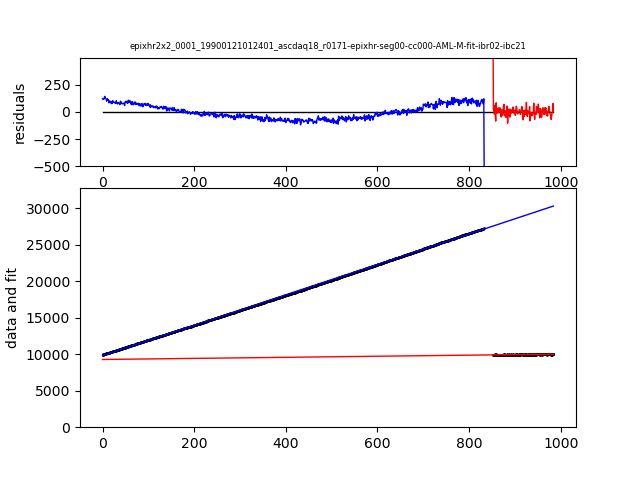
AML bad pixel
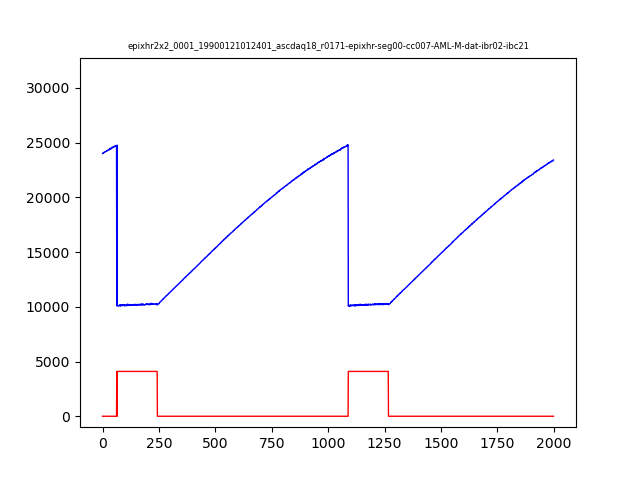

AHL good pixel

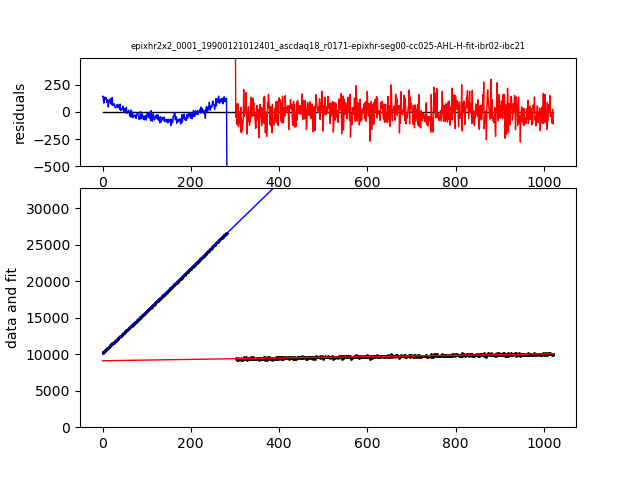
AHL bad pixel
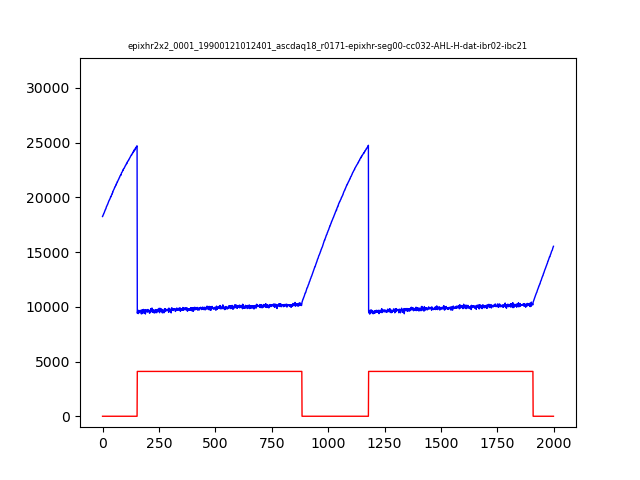

Constants


pixel status
Arrays of offset, gain, chi2 in AML-M, AML-L, AHL-H, AHL-L and a couple of arrays with number of found pulser periods in AML and AHL are used to evaluate pixel status.
At first stage pixels in the good range (as shown in table) are selected.
value | min | max | good range |
|---|
| offset | 0 | <data-bits> | (min, max) |
| gain | 0 | <data-bits>/10 | (min, max) |
| chi2 | 0 | unlimited | (min, max) |
| neg | 1 | 3 | [min, max] |
Then, for each array (except neg) pixels in good range two median values are evaluated,
med = median(arr)
spr = median(|arr-med|)
Finally, pixels between the limits
med ± nsigm * spr, where by default nsigm=8
are considered as good, while other marked by the status bit in the pixel_status_ci array, with summary table printed at the end of the job,
[I] UtilsEpix10kaChargeInjection.py L0997
Summary of the bad pixel status evaluation, pixel_status array shape:(288, 384) size:110592 dtype:uint64
0o1: 89412 / 110592 (80.849%) pixels AML number of CI pulser periods < 1
0o2: 0 / 110592 ( 0.000%) pixels AML number of CI pulser periods > 3
0o4: 87561 / 110592 (79.175%) pixels AHL number of CI pulser periods < 1
0o10: 1 / 110592 ( 0.001%) pixels AHL number of CI pulser periods > 3
0o20: 90643 / 110592 (81.962%) pixels offset_ml_m <= 4967.606
0o40: 578 / 110592 ( 0.523%) pixels offset_ml_m >= 15297.282
0o100: 89760 / 110592 (81.163%) pixels offset_ml_l <= 7433.904
0o200: 3115 / 110592 ( 2.817%) pixels offset_ml_l >= 11402.713
0o400: 87570 / 110592 (79.183%) pixels offset_hl_h <= 0.000
0o1000: 575 / 110592 ( 0.520%) pixels offset_hl_h >= 20707.813
0o2000: 87605 / 110592 (79.215%) pixels offset_hl_l <= 5815.481
0o4000: 3 / 110592 ( 0.003%) pixels offset_hl_l >= 13108.555
0o10000: 89849 / 110592 (81.244%) pixels gain_ml_m <= 13.133
0o20000: 6 / 110592 ( 0.005%) pixels gain_ml_m >= 25.567
0o40000: 93851 / 110592 (84.862%) pixels gain_ml_l <= 0.324
0o100000: 507 / 110592 ( 0.458%) pixels gain_ml_l >= 1.413
0o200000: 90913 / 110592 (82.206%) pixels gain_hl_h <= 6.156
0o400000: 0 / 110592 ( 0.000%) pixels gain_hl_h >= 96.874
0o1000000: 89096 / 110592 (80.563%) pixels gain_hl_l <= 0.663
0o1000000: 71 / 110592 ( 0.064%) pixels gain_hl_l >= 1.200
0o4000000: 89648 / 110592 (81.062%) pixels chi2_ml_m <= 0.000
0o10000000: 3380 / 110592 ( 3.056%) pixels chi2_ml_m >= 343865.194
0o20000000: 89648 / 110592 (81.062%) pixels chi2_ml_l <= 0.000
0o40000000: 4092 / 110592 ( 3.700%) pixels chi2_ml_l >= 12921.188
0o100000000: 87570 / 110592 (79.183%) pixels chi2_hl_h <= 0.000
0o200000000: 4101 / 110592 ( 3.708%) pixels chi2_hl_h >= 707366.964
0o400000000: 87570 / 110592 (79.183%) pixels chi2_hl_l <= 0.000
0o1000000000: 4230 / 110592 ( 3.825%) pixels chi2_hl_l >= 74386.133
AML-M plots for offset, gain, and chi2
Images corresponds to --slice "0:144,0:192" single ASIC of total panel shape:(288, 384).
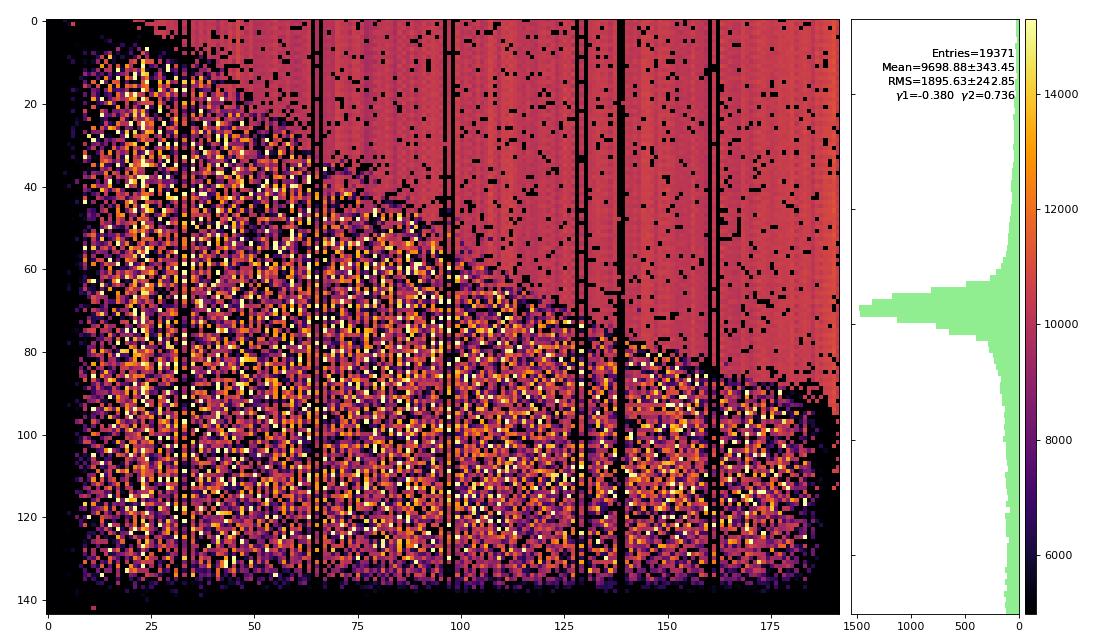


Summary
- charge injection processing for epixhr is ready
- single-ASIC panel contains a lot of dead and noisy pixels
- H and M gain modes shows significant non-linearity
- fit results in terms of offset and gain constants are saved along with chi2 and pixel status arrays
- Philip: at 1st stage this script will be used for detector characterization
- pedestals are not re-evaluated
- gains are not used directly
References













